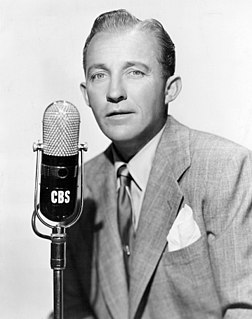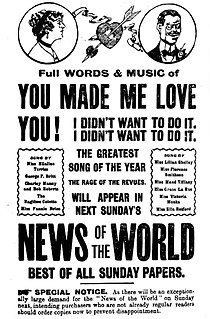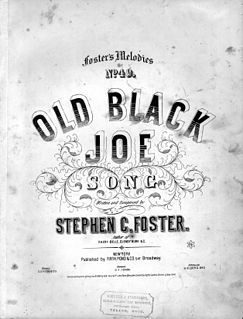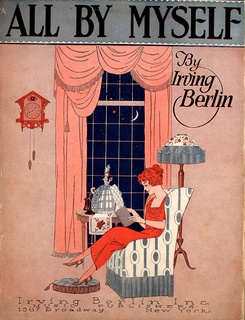Related Research Articles

Harry Lillis Crosby Jr., known professionally as Bing Crosby, was an American singer and actor. The first multimedia star, he was one of the most popular and influential musical artists of the 20th century worldwide. He was a leader in record sales, radio ratings, and motion picture grosses from 1926 to 1977. He made over 70 feature films and recorded more than 1,600 songs.

"Carolina in the Morning" is a popular song with words by Gus Kahn and music by Walter Donaldson, first published in 1922 by Jerome H. Remick & Co.

The Singing Fool is a 1928 American musical drama part-talkie motion picture directed by Lloyd Bacon which was released by Warner Bros. The film stars Al Jolson in blackface and is a follow-up to his previous film, The Jazz Singer. It is credited with helping to cement the popularity of American films of both sound and the musical genre.
"Back in Your Own Backyard" is a popular song. Officially the credits show it as written by Al Jolson, Billy Rose, and Dave Dreyer; in fact, Billy Rose was exclusively a lyricist, Dreyer a composer, and Al Jolson a performer who was often given credits so he could earn some more money, so the actual apportionment of the credits would be likely to be music by Dreyer, lyrics by Rose, and possibly some small contribution by Jolson.
"Pretty Baby" is a song written by Tony Jackson during the Ragtime era. The song was remembered as being prominent in Jackson's repertory before he left New Orleans in 1912, but was not published until 1916.

"Swanee" is an American popular song written in 1919 by George Gershwin, with lyrics by Irving Caesar. It is most often associated with singer Al Jolson.
"The One I Love " is a popular song composed by Isham Jones with lyrics by Gus Kahn. The song was recorded by Isham Jones' Orchestra on December 21, 1923, at Brunswick Studios in New York City, and published on January 7, 1924. On January 17 in Chicago, Jones recorded another version, with Al Jolson on lead vocals. Both versions made the charts that Spring, with Jolson's peaking at number 2, and Jones' at number 5. Sophie Tucker recorded her version February 1924, released on Okeh 40054.

"You Made Me Love You " is a popular song from 1913 composed by James V. Monaco with lyrics by Joseph McCarthy. It was introduced by Al Jolson in the Broadway revue The Honeymoon Express (1913), and used in the 1973 revival of the musical Irene.

"Rock-a-Bye Your Baby with a Dixie Melody" is a popular song written by Jean Schwartz, with lyrics by Sam M. Lewis and Joe Young. The song was introduced by Al Jolson in the Broadway musical Sinbad and published in 1918.

"Old Black Joe" is a parlor song by Stephen Foster (1826–1864). It was published by Firth, Pond & Co. of New York in 1860. Ken Emerson, author of the book Doo-Dah! (1998), indicates that Foster's fictional Joe was inspired by a servant in the home of Foster's father-in-law, Dr. McDowell of Pittsburgh. The song is not written in dialect.
"Down Among the Sheltering Palms" is a popular song.
"How Deep Is the Ocean?" is a popular song written by Irving Berlin in 1932. The song was developed from an earlier Berlin song "To My Mammy" which was sung by Al Jolson in his film Mammy (1930). In the earlier song, the lyrics include the questions "How deep is the ocean? / How high is the sky?" and this was the genesis of "How Deep Is the Ocean?".

"After You've Gone" is a 1918 popular song composed by Turner Layton with lyrics by Henry Creamer. It was recorded by Marion Harris on July 22, 1918, and released by Victor Records. The chorus adheres to a standard ABAC pattern but is only 20 measures long. There are four 4-bar phrases, followed by a 4 measure tag. The song is harmonically active, with chord changes almost every measure. The opening four notes are identical to the opening notes of Peg o' My Heart (1912)—at the time songwriters often borrowed the first few notes of a hit melody. The song was so popular that the sheet music was later decorated with tiny photographs of the 45 men who made the song famous, including Paul Whiteman, Rudy Vallée, B.A. Rolfe, Guy Lombardo, and Louis Armstrong.
"Waves of the Danube" is a waltz composed by Iosif Ivanovici in 1880, and is one of the most famous Romanian tunes in the world. The song has many variations throughout the piece, reminiscent of the music of Johann Strauss. Through the Viennese style variations, there is still a distinct Slavic style. In the United States, it is frequently referred to as "The Anniversary Song", a title given by Al Jolson when he and Saul Chaplin released an adaptation of the song in 1946.

"All by Myself" is a popular song written by Irving Berlin, published in 1921.

Al Jolson was a Lithuanian-American singer, comedian, actor, and vaudevillian. He was one of United States most famous and highest-paid stars of the 1920s, and was self-billed as "The World's Greatest Entertainer." Jolson was known for his "shamelessly sentimental, melodramatic approach" towards performing, as well as for popularizing many of the songs he sung. Jolson has been referred to by modern critics as "the king of blackface performers."

Billy Merson was an English music hall performer and songwriter.
Liza " is a song composed by George Gershwin with lyrics by Ira Gershwin and Gus Kahn. It was introduced in 1929 by Ruby Keeler in Florenz Ziegfeld's musical Show Girl. The stage performances were accompanied by the Duke Ellington Orchestra. On the show's opening night in Boston on June 25, 1929, Keeler's husband and popular singer Al Jolson suddenly stood up from his seat in the third row and sang a chorus of the song, much to the surprise of the audience and Gershwin himself. Jolson recorded the song a few days later on July 6, 1929, and his rendition rose to number nine on the charts of the day.
"When the Red, Red Robin " is a popular song written, both words and music, by Harry Woods in 1926. The song became the signature song for singer and actress Lillian Roth, who performed it often during the height of her musical career from the late 1920s to the late 1930s.
Bing Crosby Sings with Al Jolson, Bob Hope, Dick Haymes and the Andrews Sisters is a Bing Crosby Decca Records studio 78rpm album of phonograph records featuring Crosby with several of Decca's top artists.
References
- ↑ John J. Gross (1994), The Oxford book of comic verse, ISBN 9780192142078
- ↑ "The Online Discographical Project". 78discography.com. Retrieved July 28, 2017.
- ↑ William Ruhlmann (23 April 2004), Breaking records: 100 years of hits, ISBN 9780203644034
- ↑ Edwin M. Bradley (11 August 2004), The First Hollywood Musicals, ISBN 9780786420292
- ↑ "A Bing Crosby Discography". BING magazine. International Club Crosby. Retrieved July 28, 2017.